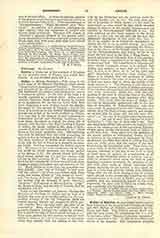

Abdias of Babylon, an apocryphal writer, said to have been one of the seventy-two Disciples of Christ, and first Bishop of Babylon, consecrated by Sts. Simon and Jude. Very little is known about him and the main reason for mentioning him is a work in ten books called “Historia Certaminis Apostolici” which is imputed to him. It tells of the labors and deaths of the Apostles. This compilation purports to have been translated from Hebrew into Greek by Eutropius, a disciple of Abdias, and, in the third century, from Greek into Latin by (Julius) Africanus, the friend of Origen. But it is really a Latin work, for in it are cited, with the Vulgate of St. Jerome, the “Ecclesiastical History” of Rufinus and his Latin translation of the “Recognitiones” of Clement. The interest of the work is due to what the author claims to have drawn from the ancient “Acta” of the Apostles, and to many ancient legends which have thus been brought down to us. The text of the pseudo-Abdias may be found in Fabricius, “Codex Apocryphus Novi Testimenti” (Hamburg, 1700), 402-742, though there are parallel texts of single books printed in the “Acta Sanctorum.” According to R.A. Lipsius, the work was compiled during the latter half of the sixth century, in some Frankish monastery, for the purpose of satisfying the natural curiosity of Western Christians. At the same time he used much older pseudo-Apostolic materials that he abridged or excerpted to suit his purpose, and often revised or expurgated in the sense of Catholic teaching, for not a few of the writings that he used were originally Gnostic compositions, and abounded in speeches and prayers destined to spread that heresy.
JOHN J. A’ BECKET

